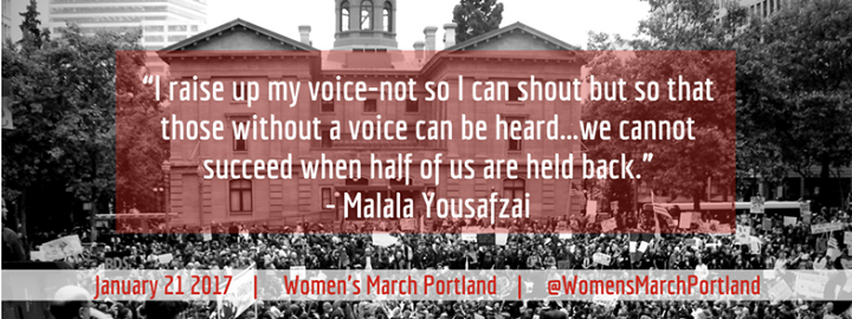 A long-time friend called me yesterday because he was trying to understand. "Is this about that video? Because that's not all that unusual." I agree that it's not unusual, and it's certainly not the worst I've ever seen or heard. Trump seemed to be marveling at how women fawned all over him just because he was a TV star, more than he was bragging about sexual conquest. A lot of women were offended, sure, and rightfully so -- nothing will change if we don't express outrage, and there are plenty of amazing, supportive men who would NEVER say anything like that, in a locker room or anywhere else. But that's not what marching was about. I had the privilege of joining the Portland planning team just a couple days after it formed -- a mere two weeks before the march. I had no idea who they were. I realize now that I also had very little knowledge of what the march was about. There was a lot of conversation beforehand, and some arguing and accusing and hurt feelings, all parts of learning and growing. It was powerful and educational and humbling. I am a white woman of privilege. It doesn't matter that I'm poor or disabled or old. I grew up in an outstanding school district. I had access to college. I was safe walking alone at night. The police were there to protect me. Here in Portland, my neighbors support me and my work. I could name a hundred people who would come to my defense if I were ever in serious trouble. A lot of white women of privilege marched because they are offended by Trump's sexist comments, his belittling treatment of women, his sexual-predator behavior, his complete lack of understanding of women's issues. But that isn't really what the march was about, and I hope these women take this opportunity to look deeper and grow. The march was about human rights for everyone, mostly those whom society passes over. It was about shining a light on the dark underside of our political system that still ignores the voices and needs of our black citizens, our Latina citizens, our mentally ill, our religiously diverse, and so many others. It was about taking this opportunity, when all women felt the outrage of our rights being threatened, and building it into a meaningful statement and conversation about ALL Americans deserving decent treatment, respect, a voice, and the so-elusive equal rights we think we've already talked to death. Trump is a disaster of a choice for president, and we'll have to watch him like a hawk. He over-simplifies every complex national and global situation and bulldozes his way through delicate relationships and alliances. He thinks his job is about winning rather than about serving. He isn't willing to learn and grow, or even read. He lives in his own fictional reality. But that's not our biggest problem. Our biggest problem is that radical, wealthy, religious ultra-fundamentalist conservatives think that they have the right to decide who matters and who doesn't. They believe they have the power to run America. They have the support of the president, and they can influence him dramatically. It's not about our new president's vulgarity. It's about his weakness. With all that money trying to take over our government, those of us without any have to work far harder than we ever have before to rebuild our democracy. Those of us who never really understood oppression need to learn from our diverse sisters and rise up, not only for ourselves and our rights as women, but for all of them, whose voices haven't been heard, ever. If we are to be a truly democratic, fair, healthy civilization, we have to stand up for the least of us. We have to recognize that demographic statistics reveal NOTHING about character and strength, intelligence and value. The women who organized Portland's march were powerful. They were also black, trans, Jewish, disabled, old, gay, abused, underpaid, indigenous, and mostly unseen. Until now. We must see them and learn from them. We must value ALL our people. This nation was built on diversity, and diversity is under attack. It's time to stand up, speak out, and march.
0 Comments
Leave a Reply. |
AuthorSusie Snortum is passionate about improving society's compassion for meeting basic human needs -- food, shelter, clean water, and dignity. Archives
September 2020
Categories |
We appreciate your support!
Hours
|
Telephone
|
Email
|
ADDRESS: 17850 NW Park View Blvd, Portland, OR 97229 United States

 RSS Feed
RSS Feed